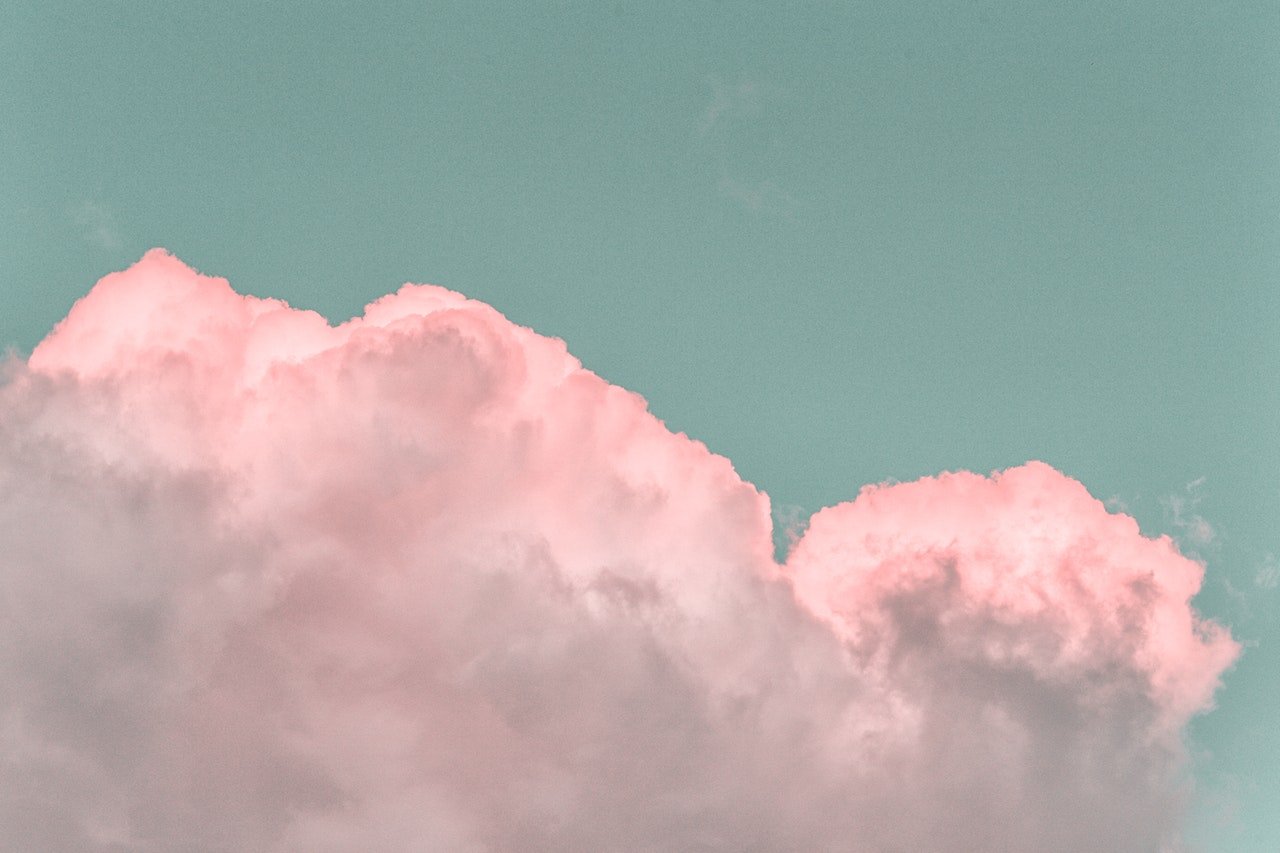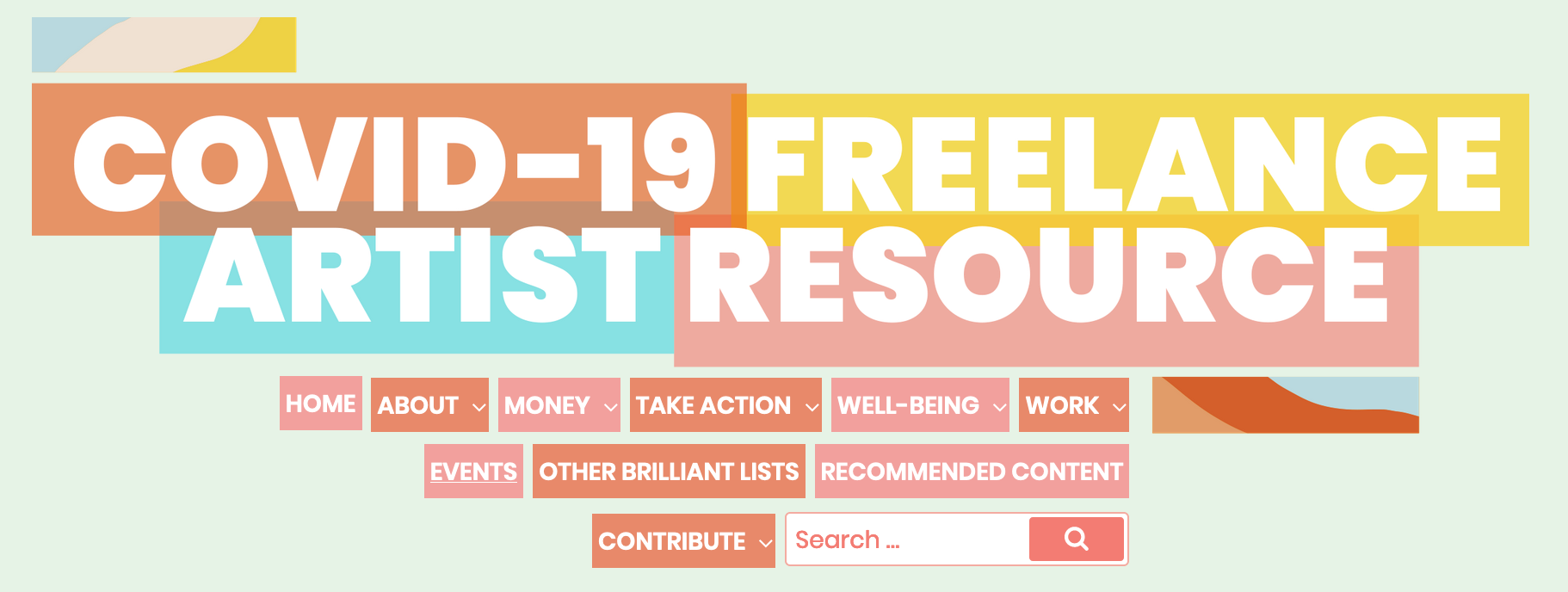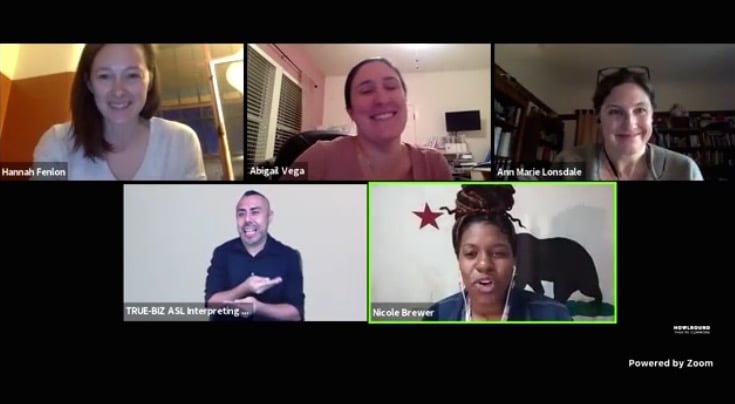Triage and Transformation: An Interview with the Freelance Artist Resource Producing Collective
On March 12, in the early phases of national lockdowns in the United States, a Google Doc with resources for freelance artists started making the rounds. It had links to information and resources for freelancers who were getting their jobs cancelled because of COVID-19, including emergency funding. Like other Google Docs that serve an immediate need at the right time, it exploded. The document crashed and its creators quickly shifted the Google Doc to a website. Since then, its creators have become a temporary collective, the Freelance Artist Resource Producing Collective.
The collective members are Amara Brady, Nicole Brewer, Hannah Fenlon, Ann Marie Lonsdale, and Abigail Vega. Collectively, they are managing the COVID-19 Freelance Artist Resource website and hosting webinars to “provide resources to and raise the collective knowledge body of freelance, unaffiliated artists in the United States.” The collective is a “short term intervention that gathers and amplifies efforts and ideas that secure freelance artists’ livelihood and centers their humanity in the immediate present, while preparing the US arts and culture field for a radically equal, inclusive, anti-racist, and progressive future.”
They recently redesigned their website and are wrapping up an ambitious event calendar. They spoke with Fractured Atlas about how they came to be a collective, how they are supporting their community, and how they are looking to the future for their own work and for the arts community at large.
What is the origin story for the Freelance Artist Resource page?
On March 11, anti-racist theatre practitoner Nicole Brewer posted a message to a private Facebook group for alumni of artEquity, a national cohort of artist-activists who envision and work towards a radically inclusive, anti-racist performing arts ecology. Hannah Fenlon, Ann Marie Lonsdale, Abigail Vega, and others soon responded with interest in the discussion, which would be centered around collecting emergency resources for freelancers and artists who were losing gigs and income due to COVID-19.
What started as a Facebook post soon morphed into a Google Doc filled with links to existing emergency funding resources and information, which was widely shared throughout the day on March 12 causing the original document to crash. In order to handle the extreme amount of interest, Hannah created the Wordpress site to help the group manage the growing list of resources. Through crowdsourcing, Ann Marie, Abigail, and Hannah vetted dozens of submissions from across the United States and internationally.
At the same time, the four co-creators called on colleagues and friends from across the country to provide content for a live web-cast on Howlround TV, bringing together funders, attorneys, arts advocates, artists, finance experts, and community activists to hold space for artists who were experiencing the terrifying brunt of the economic fallout from COVID-19. The event on March 16 was viewed live by over 4,500 people (and has been viewed many times since). By that morning, the resource website had been visited over 200,000 unique times.
In the absence of immediate relief from government, arts leaders, and funders, our producing collective stepped in to create a knowledge-sharing system for freelance artists, by freelance artists. At the time of the COVID-19 crisis, none of the co-creators were institutionally affiliated, and our deep desire was and is to create space for the humanity of freelance artists and arts workers who need support the most.
COVID-19 Freelance Artist Resource website (which has recently received an exciting facelift!), is a collection of links and information relevant to freelance artists living and working in the United States. It contains resources related to Emergency Funding, Financial and Legal Information, information about Working and Teaching Online, Health and Mental Health Resources, Events, Anti-Racism Resources, and more. Much of the content for the site is crowdsourced from the community of users, and it is updated daily. Our website has been replicated in Canada and the UK, with our blessing and support, by fellow artists who are tending to those communities. By early May 2020, the COVID-19 Freelance Artist Resource website had over 800,000 views and more than 500,000 unique users.
Tell us more about the community that you are engaging and sharing resources with. Who are they, what are their needs and concerns, and what have you learned from them?
We wanted to bridge those who are not connected (say through professional or service organizations or unions) to one another and groups that would address and advocate for their needs. Inevitably, we have also connected with nonprofit producing entities, service organizations, and foundations, but our main concern is how to build power with and for the freelance community.
This crisis has exposed the cracks in so many oppressive and capitalistic systems leaving artists behind to fend for themselves.
One of the ways we are addressing the needs of the freelance artist community is to take into consideration the conditions that were our cultural norms before COVID-19: institutional racism, homophobia and transphobia; the broken economic models that were crumbling before our very eyes; extractive labor practices that leave artists subsidizing arts institutions; misogyny of nonprofit workplaces that leave women and parents unable to care for their children or take paid time off; the lack of worker protections and safety nets in our larger society leaving artists unable to make a living, access to health insurance or health care; and our arts institutions inability to support independent artists and arts workers through this crisis.
There is so much need for freelancers (and everyone) that it's overwhelming to know how to help. How has the collective made decisions about what you can provide in terms of information, programming, and resources?
We have focused pretty explicitly on free resources that support freelance artists’ ability to get paid, build their careers, connect with one another, heal, and build resilience in this moment. We have stayed away from supporting folks’ individual artistic efforts and practices, mostly because there are too many offerings for us to equitably promote. In our first weeks, we watched the website’s stats closely to understand which pages users were visiting, and we focused our energy on building out those pages so that they were offering a full range of possibilities (knowing that our visitors ran the gamut from New York City Equity actors to rural California photographers).
We were also really mindful of the myriad of ways in which folks were processing this experience and recognized not everyone was ready to talk about “pivoting” in late March when their income was being ripped from them and they were anxious about how to feed their families. With that in mind, we’ve spent a lot of energy delivering content (in particular our HowlRound webinars) that accounts for this diversity of response, and invites artists to take care of themselves.
We also saw a need to update the website to make it more user friendly and accessible. As we built our new site, we prioritized the crowdsourcing element, and have (we think) made it even simpler to add resources and events to the site. We envision this project as a form of mutual aid: if there’s a resource in your community that could support others, our hope is that you’ll add it to the site.
How did you arrive at the current iterations of your Values and why is it important for you to have them?
We worked together for about three weeks without a written mission, vision, and values. Once the website was up and running and we’d produced our first two webinars, we had a moment to breathe and check in: what were we actually doing and perhaps more importantly, how did we want to do it?
A shared ethos was there, we just hadn’t articulated it yet. Abigail Vega typed up the first pass for a guiding document in about thirty minutes (and you can see the result of our edits on our site). We continue to check in on if the values have shifted, but seven weeks in, they still feel right. Ultimately, our values can be boiled down to one thing:
We center care in all that we do. We strive to recognize the humanity of ourselves and the folks we work with, especially in a global pandemic. We pay folks, we tithe to good organizations, we work in draft, and we try to forgive. We don’t push it.
Tell us about how you organize yourselves as a collective - how do you think about equitable work, responsibility, and ensuring that everyone's voice is heard?
Recently, we established a set of community agreements to support our collaboration. Many of these were understood tacitly, but making them explicit has been deeply meaningful. These include tending to our emotional experiences, making space for reflection and not knowing, engaging in check in’s with one another before work begins, and managing time and our agenda as a group. The time it took to discuss and agree on these guidelines was worth the efficiency and sense of purpose they have already brought to our work together.
We all do both the “small” and the “big” jobs. We keep the budget, update the website, and send Zoom invites; and we all vision programs, have strategic conversations, and give interviews.
Where are you focusing your energies and efforts for the next phase of your collective?
First and foremost, we’re focused on launching and sharing the newest version of our site. We know this crisis will continue impacting freelance artists for months (perhaps years) to come, and have determined a central clearing house for information will continue to be useful. As for other programs, we are excited to wrap up our HowlRound series next week (May 12), with a session by, for, and about the AAPI community, which has experienced an aggressive uptick in racist attacks as a result of this crisis.
The first phase of our work was triage - tending to the immediate needs of the community and treating the wounds exacerbated by (but not necessarily originally created by) COVID-19. In our next phase, we’re interested in transformation.
The current conversation around systems change in our arts and culture sector is getting louder and more vibrant. How can we encourage artists to advocate for one another, to support one another when institutions and the federal government are unable to? How can we center the most vulnerable in our artist community, and focus our energy on protecting them as we would protect ourselves? How do we make sure freelance artists, who are our sector’s lifeblood, are central to that conversation, and feel tied to and supported by one another?
You can follow the Freelance Artist Producing Collective’s work on their newly redesigned website, check out their upcoming events, and contribute to their work financially or by submitting your own events or resources.
About Nina Berman
Nina Berman is an arts industry worker and ceramicist based in New York City, currently working as Associate Director, Communications and Content at Fractured Atlas. She holds an MA in English from Loyola University Chicago. At Fractured Atlas, she shares tips and strategies for navigating the art world, interviews artists, and writes about creating a more equitable arts ecosystem. Before joining Fractured Atlas, she covered the book publishing industry for an audience of publishers at NetGalley. When she's not writing, she's making ceramics at Centerpoint Ceramics in Brooklyn.




